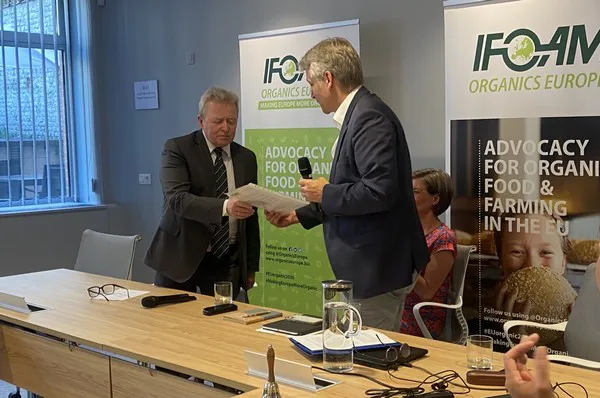In a resolution adopted yesterday at its General Assembly, the European organic movement re-affirms that organic production should remain free from GMOs including from New Genomic Techniques (NGTs).
It also emphasizes the importance of maintaining the possibility of a systemic approach to innovation in agriculture. This resolution comes ahead of the European Commission’s publication of a proposal on New Genomic Techniques, expected on 5 July. European Commissioner for Agriculture, Janusz Wojciechowski, received the resolution during an official handover ceremony, and ensured the organic movement of his vigilance concerning the impact of the NGT proposal on organic farming.
IFOAM Organics Europe’s President Jan Plagge stresses: “To make our food systems truly sustainable, we need to transition away from input-intensive, short-term fixes, which include the promotion of specific technologies with unproven benefits and potential unintended effects and risks. Genetic engineering with its currently still empty sustainability promises, and a narrow focus on specific genes or traits, ignores the complexity of interactions in a given agroecosystem. For decades, the organic movement has been a main driver for nature-based regenerative systems of agroecological innovation. To safeguard this holistic approach to agronomic innovation, EU legislation must protect GMO-free and organic production from contamination, through mandatory traceability all along the production chain and consumers labelling, which are the only way to envisage a real “coexistence”.”
Jan Plagge also warned about the impact of patents on plants and animals associated with NGTs: “New GMOs will contribute to monopolising patents on genetic material in the hands of just a few companies. Traceability is essential to protect breeders and farmers from patents on seeds – a common concern shared by many farmers organizations across the board – and to safeguard the possibility for a more systemic and truly sustainable approach to plant breeding, that fully considers the complexity of agroecosystems.
 Handover of the European organic movement’s resolution to Commissioner of Agriculture Janusz Wojciechowski by IFOAM Organics Europe President Jan Plagge.
Handover of the European organic movement’s resolution to Commissioner of Agriculture Janusz Wojciechowski by IFOAM Organics Europe President Jan Plagge.
The resolution of the organic movement in favour of a system-based approach of innovation and sustainability – Keep organic GMO-free was adopted with an overwhelming majority (97.69% of votes in favour, 2,31% against) at IFOAM Organics Europe’s General Assembly in Brussels on Wednesday 21 June 2023.
Summary of the IFOAM Organics Europe resolution
The resolution re-affirms the demand of organic breeders, farmers, processors, certifiers, traders, and retailers for the preservation of their freedom of choice to remain GMO-free, including GMOs derived from New Genomic Techniques (NGTs). Organic producers also want to fulfil their commitment towards consumers to guarantee a GM-free production process. For that reason, the principle of labelling and traceability enshrined in the current legislation, which allows for the identification of GMOs throughout the supply chain, must be maintained and applied to all NGTs.
For more information:
Eric Gall
Tel.: +32 491 07 25 37
[email protected]
www.organicseurope.bio
